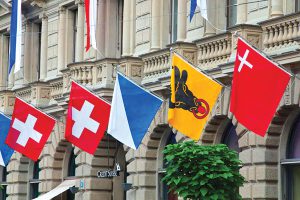Bloomberg
Swiss banks may hold more than $200 billion of Russian wealth, the country’s banking lobby estimates, as sanctions shine a spotlight on the extent of Russian wealth stored in overseas vaults.
Banks probably hold between 150 billion ($160 billion) and 200 billion Swiss francs of Russian client money in offshore accounts, according to the Swiss Bankers Association. Credit Suisse Group AG Chief Executive Officer Thomas Gottstein said earlier this week that Russian money accounted for about 4% of assets at the bank’s wealth management
division.
The country of 8.6 million inhabitants has long been attractive for wealthy Russians, lured by the discretion and light-touch regulation it offers. While data from the Basel-based Bank for International Settlements show Russian residents and companies held $11 billion in Swiss bank accounts as of September, more than double the roughly $5 billion in the UK, that number figure grossly understates the extent of Russian wealth in the country, because it doesn’t include brokerage accounts, investments or assets held through offshore companies.
Private bankers at the country’s biggest wealth managers, who requested anonymity to discuss internal information, earlier this month estimated that rich Russians have in excess of $100 billion stashed away across the country’s lenders, with one person putting the figure at $300 billion — equal to almost 40% of the Swiss economy.
Wealthy Russians with links to President Vladimir Putin have seen their assets frozen across the world, while other rich bank clients who borrowed against Russian assets have to come up with more collateral after those securities plunged in value. Bloomberg reported previously that UBS Group AG and Credit Suisse are both triggering margin calls on some customers who use Russian bonds as collateral, after marking down the value of debt issued by the country and its corporations.
The Swiss government broke with a long-entrenched tradition of neutrality and agreed to enforce European Union sanctions against Russian companies and individuals including Putin and Foreign Minister Sergei Lavrov late last month. The government’s decision to implement the sanctions came after a weekend in which it was criticized by opposition politicians, editorials in leading Swiss papers as well as by other governments.
In contrast to the UK’s more aggressive approach, Switzerland however is so far relying on banks or other holders of sanctioned Russian assets to report these to the government. It’s not clear yet how much cash held by Swiss banks has been frozen to date.
 The Gulf Time Newspaper One of the finest business newspapers in the UAE brought to you by our professional writers and editors.
The Gulf Time Newspaper One of the finest business newspapers in the UAE brought to you by our professional writers and editors.
